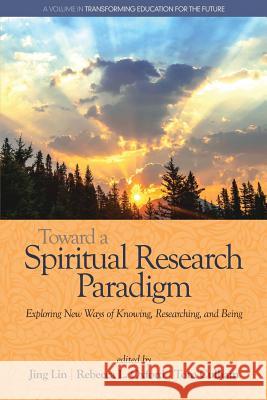Toward a Spiritual Research Paradigm: Exploring New Ways of Knowing, Researching and Being » książka
Toward a Spiritual Research Paradigm: Exploring New Ways of Knowing, Researching and Being
ISBN-13: 9781681234946 / Angielski / Miękka / 2016 / 308 str.
A volume in Transforming Education for the Future Spirituality and spiritual experiences have been the bedrock of every civilization and together form one of the highest mechanisms for making sense of the world for billions of people. Current research paradigms, due to their limitation to empirical, sensory, psychologically, or culturally constructed realities, fail to provide a framework for exploring this essential area of human experience. The development of a spiritual research paradigm will provide researchers from the social sciences and education the tools and abilities to systematically explore fundamental questions regarding human spiritual experiences and spiritual growth. A spiritual research paradigm requires an ontology that considers all reality to be multidimensional, interconnected, and interdependent. It requires an epistemology that integrates knowing from outer sources as well as inner contemplation, acknowledging our integration of soul and spirit with the body and mind. Three additional aspects are useful to a spiritual research paradigm: axiology, methodology, and teleology. An axiology concerns what is valued, good, and ethical. A methodology is the appropriate approach to systematic inquiry. A fifth and less frequently mentioned aspect is teleology, an explanation of the goal or end (telos) to which new knowledge is applied, such as gaining wisdom and truth, touching the divine, increasing inner peace, exploring hidden dimensions, or improving society. This book takes the first step to develop such a research paradigm. We draw from world spiritual traditions as well as scholarship that has arisen from contemplative practices. We also attempt to build a bridge between science and spirituality. Spiritual research is not necessarily opposed to scientific research; in fact, each can shed light on the other.
A volume in Transforming Education for the FutureSpirituality and spiritual experiences have been the bedrock of every civilization and together form one of the highest mechanisms for making sense of the world for billions of people. Current research paradigms, due to their limitation to empirical, sensory, psychologically, or culturally constructed realities, fail to provide a framework for exploring this essential area of human experience. The development of a spiritual research paradigm will provide researchers from the social sciences and education the tools and abilities to systematically explore fundamental questions regarding human spiritual experiences and spiritual growth.A spiritual research paradigm requires an ontology that considers all reality to be multidimensional, interconnected, and interdependent. It requires an epistemology that integrates knowing from outer sources as well as inner contemplation, acknowledging our integration of soul and spirit with the body and mind. Three additional aspects are useful to a spiritual research paradigm: axiology, methodology, and teleology. An axiology concerns what is valued, good, and ethical. A methodology is the appropriate approach to systematic inquiry. A fifth and less frequently mentioned aspect is teleology, an explanation of the goal or end (telos) to which new knowledge is applied, such as gaining wisdom and truth, touching the divine, increasing inner peace, exploring hidden dimensions, or improving society. This book takes the first step to develop such a research paradigm. We draw from world spiritual traditions as well as scholarship that has arisen from contemplative practices. We also attempt to build a bridge between science and spirituality. Spiritual research is not necessarily opposed to scientific research; in fact, each can shed light on the other.











